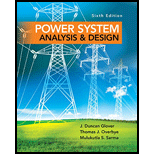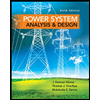
Power System Analysis and Design (MindTap Course List)
6th Edition
ISBN: 9781305632134
Author: J. Duncan Glover, Thomas Overbye, Mulukutla S. Sarma
Publisher: Cengage Learning
expand_more
expand_more
format_list_bulleted
Textbook Question
Chapter 2, Problem 2.31MCQ
One advantage of balanced three-phase systems over separate singlephase systems is reduced capital and operating costs of transmission and distribution.
(a) True
(b) False
Expert Solution & Answer
Want to see the full answer?
Check out a sample textbook solution
Students have asked these similar questions
B) A 60-Hz generator is supply ing 60% of P max to an infinite bus through a reactive network.
A fault occurs which increases the reactance of the network between the generator internal
voltage and the infinite bus by 400%. When the fault is cleared, the maximum power that can
be delivered is 80% of the original maximum value. Determine the critical clearing angle for
the condition described.
Q3)
A: A generator operating at 50 Hz delivers 1 pu power to an infinite bus through a transmission
circuit in which resistance is ignored. A fault takes place reducing the maximum powe transferable
to 0.5 pu whereas before the fault, this power was 2.0 pu and after the clearance of the fault, it is
1.5 pu. By the use of equal area criterion, determine the critical clearing angle.
4. For the periodic signal shown in Fig. 4;
a) Find the exponential Fourier Series for y(t).
b) Use Parseval's Theorem to compute the total power contained in the 4th harmonic and all higher
harmonics.
2+
y(t)
+
-2л
-л
0
2л
Зл
4л
Fig. 4
Chapter 2 Solutions
Power System Analysis and Design (MindTap Course List)
Ch. 2 - The rms value of v(t)=Vmaxcos(t+) is given by a....Ch. 2 - If the rms phasor of a voltage is given by V=12060...Ch. 2 - If a phasor representation of a current is given...Ch. 2 - Prob. 2.4MCQCh. 2 - Prob. 2.5MCQCh. 2 - Prob. 2.6MCQCh. 2 - Prob. 2.7MCQCh. 2 - Prob. 2.8MCQCh. 2 - Prob. 2.9MCQCh. 2 - The average value of a double-frequency sinusoid,...
Ch. 2 - The power factor for an inductive circuit (R-L...Ch. 2 - The power factor for a capacitive circuit (R-C...Ch. 2 - Prob. 2.13MCQCh. 2 - The instantaneous power absorbed by the load in a...Ch. 2 - Prob. 2.15MCQCh. 2 - With generator conyention, where the current...Ch. 2 - Consider the load convention that is used for the...Ch. 2 - Prob. 2.18MCQCh. 2 - The admittance of the impedance j12 is given by...Ch. 2 - Consider Figure 2.9 of the text, Let the nodal...Ch. 2 - The three-phase source line-to-neutral voltages...Ch. 2 - In a balanced three-phase Y-connected system with...Ch. 2 - In a balanced system, the phasor sum of the...Ch. 2 - Consider a three-phase Y-connected source feeding...Ch. 2 - For a balanced- load supplied by a balanced...Ch. 2 - A balanced -load can be converted to an...Ch. 2 - When working with balanced three-phase circuits,...Ch. 2 - The total instantaneous power delivered by a...Ch. 2 - The total instantaneous power absorbed by a...Ch. 2 - Under balanced operating conditions, consider the...Ch. 2 - One advantage of balanced three-phase systems over...Ch. 2 - While the instantaneous electric power delivered...Ch. 2 - Given the complex numbers A1=630 and A2=4+j5, (a)...Ch. 2 - Convert the following instantaneous currents to...Ch. 2 - The instantaneous voltage across a circuit element...Ch. 2 - For the single-phase circuit shown in Figure...Ch. 2 - A 60Hz, single-phase source with V=27730 volts is...Ch. 2 - (a) Transform v(t)=75cos(377t15) to phasor form....Ch. 2 - Let a 100V sinusoidal source be connected to a...Ch. 2 - Consider the circuit shown in Figure 2.23 in time...Ch. 2 - For the circuit shown in Figure 2.24, compute the...Ch. 2 - For the circuit element of Problem 2.3, calculate...Ch. 2 - Prob. 2.11PCh. 2 - The voltage v(t)=359.3cos(t)volts is applied to a...Ch. 2 - Prob. 2.13PCh. 2 - A single-phase source is applied to a...Ch. 2 - Let a voltage source v(t)=4cos(t+60) be connected...Ch. 2 - A single-phase, 120V(rms),60Hz source supplies...Ch. 2 - Consider a load impedance of Z=jwL connected to a...Ch. 2 - Let a series RLC network be connected to a source...Ch. 2 - Consider a single-phase load with an applied...Ch. 2 - A circuit consists of two impedances, Z1=2030 and...Ch. 2 - An industrial plant consisting primarily of...Ch. 2 - The real power delivered by a source to two...Ch. 2 - A single-phase source has a terminal voltage...Ch. 2 - A source supplies power to the following three...Ch. 2 - Consider the series RLC circuit of Problem 2.7 and...Ch. 2 - A small manufacturing plant is located 2 km down a...Ch. 2 - An industrial load consisting of a bank of...Ch. 2 - Three loads are connected in parallel across a...Ch. 2 - Prob. 2.29PCh. 2 - Figure 2.26 shows three loads connected in...Ch. 2 - Consider two interconnected voltage sources...Ch. 2 - Prob. 2.35PCh. 2 - Prob. 2.36PCh. 2 - Prob. 2.37PCh. 2 - Prob. 2.38PCh. 2 - Prob. 2.39PCh. 2 - A balanced three-phase 240-V source supplies a...Ch. 2 - Prob. 2.41PCh. 2 - A balanced -connected impedance load with (12+j9)...Ch. 2 - A three-phase line, which has an impedance of...Ch. 2 - Two balanced three-phase loads that are connected...Ch. 2 - Two balanced Y-connected loads, one drawing 10 kW...Ch. 2 - Three identical impedances Z=3030 are connected in...Ch. 2 - Two three-phase generators supply a three-phase...Ch. 2 - Prob. 2.48PCh. 2 - Figure 2.33 gives the general -Y transformation....Ch. 2 - Consider the balanced three-phase system shown in...Ch. 2 - A three-phase line with an impedance of...Ch. 2 - A balanced three-phase load is connected to a...Ch. 2 - What is a microgrid?Ch. 2 - What are the benefits of microgrids?Ch. 2 - Prob. CCSQCh. 2 - Prob. DCSQ
Knowledge Booster
Learn more about
Need a deep-dive on the concept behind this application? Look no further. Learn more about this topic, electrical-engineering and related others by exploring similar questions and additional content below.Similar questions
- 2. a) Find the Fourier transform of the signal shown in Fig. 2 and express it in its most compact form; b) Find the value of the energy spectral density at f=1/4. 0 -2 -1 -3. Fig. 1 g(t) 3 1 2 t- Fig 2arrow_forward5. Consider a filter whose transfer function is: H(f) = -12xfß (a + jπ f ) ² (a) show that the filter is non-causal for α = 3, p= -1; (b) choose alternate values of α, ẞ that result in a causal filter, and demonstrate that your choice valid.arrow_forward1. Referring to the signals shown in Fig. 1: a) Find the signal energy of x(t). 6 b) Find the signal energy of y(t) . c) Find the signal energy of x(t)+y(t) . d) Are x(t) and y(t) orthogonal? Explain how you can tell. x(t) 0 2 4 y(1) 2 0 2 4 -6 Fig. 1 1-arrow_forward
- Please can you solve this question correctly in a step by step form to help understanding, please make it clear.arrow_forwardPlease can you solve this question in a step by step form correctly, please look at the refernces provided on the data path control lines, the GPLB functions, the processor instruction setarrow_forwardPlease can you solve this question in a step by step form correctly, please look at the refernces provided on the data path control lines, the GPLB functions, the processor instruction setarrow_forward
- Please can you solve this question in a step by step form correctly, please look at the refernces provided on the data path control lines, the GPLB functions, the processor instruction set and using the PLA personality chart.arrow_forwardPlease can you solve this question correctly in a step by step form to help understanding, please make it clear.arrow_forwardI just want to know what is PPE and Give examples of itarrow_forward
- Why is a starting resistor needed to bring a motor up to speed? Show one way to reverse the direction of ro- tation of a compound motor.arrow_forward8- is flip-flop which indicates some condition which arises after the execution of an arithmetic or logic instruction. a) Status flag b) Instruction registers c) Temporary register d) None of these 9- El instruction is a_ a) Branching Instructions b) Logical Instructions c) Control Instructions d) Data Transfer Instruction e) Arithmetic Instructionsarrow_forward1. Write a program to add 4 hex numbers located in the memory locations 2001h, 2002h, 2003h, 2004h and store the result at location 2005harrow_forward
arrow_back_ios
SEE MORE QUESTIONS
arrow_forward_ios
Recommended textbooks for you
 Power System Analysis and Design (MindTap Course ...Electrical EngineeringISBN:9781305632134Author:J. Duncan Glover, Thomas Overbye, Mulukutla S. SarmaPublisher:Cengage Learning
Power System Analysis and Design (MindTap Course ...Electrical EngineeringISBN:9781305632134Author:J. Duncan Glover, Thomas Overbye, Mulukutla S. SarmaPublisher:Cengage Learning

Power System Analysis and Design (MindTap Course ...
Electrical Engineering
ISBN:9781305632134
Author:J. Duncan Glover, Thomas Overbye, Mulukutla S. Sarma
Publisher:Cengage Learning
Power System Stability in C# Part 1: Fundamentals of Stability Analysis; Author: EETechStuff;https://www.youtube.com/watch?v=SaT9oWcHgKw;License: Standard Youtube License